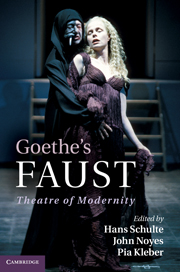Book contents
- Frontmatter
- Contents
- List of illustrations
- List of contributors
- Preface
- List of abbreviations
- Introduction
- PART I MODERNITY
- 1 Faust – today
- 2 Mephisto and the modernization of evil
- 3 Mephisto is the devil – or is he?
- 4 ‘Schwankende Gestalten’: virtuality in Goethe's Faust
- 5 Amnesia and anamnesis in Goethe's Faust
- 6 Magicians of modernity: Cagliostro and Saint-Simon in Goethe's Faust II
- 7 The blind Faust
- 8 From Faust to Harry Potter: discourses of the centaurs
- 9 Mistra and the Peloponnese in Goethe's Faust II
- 10 Goethe and the grotesque: the ‘Classical Walpurgis Night’
- 11 Re-defining classicism: antiquity in Faust II under the sign of the Medusa
- 12 Diabolical entrapment: Mephisto, the angels and the homoerotic in Goethe's Faust II
- PART II THEATRE
- Select bibliography
- Index
- References
12 - Diabolical entrapment: Mephisto, the angels and the homoerotic in Goethe's Faust II
Published online by Cambridge University Press: 01 June 2011
- Frontmatter
- Contents
- List of illustrations
- List of contributors
- Preface
- List of abbreviations
- Introduction
- PART I MODERNITY
- 1 Faust – today
- 2 Mephisto and the modernization of evil
- 3 Mephisto is the devil – or is he?
- 4 ‘Schwankende Gestalten’: virtuality in Goethe's Faust
- 5 Amnesia and anamnesis in Goethe's Faust
- 6 Magicians of modernity: Cagliostro and Saint-Simon in Goethe's Faust II
- 7 The blind Faust
- 8 From Faust to Harry Potter: discourses of the centaurs
- 9 Mistra and the Peloponnese in Goethe's Faust II
- 10 Goethe and the grotesque: the ‘Classical Walpurgis Night’
- 11 Re-defining classicism: antiquity in Faust II under the sign of the Medusa
- 12 Diabolical entrapment: Mephisto, the angels and the homoerotic in Goethe's Faust II
- PART II THEATRE
- Select bibliography
- Index
- References
Summary
The major works of German erotic literature in the eighteenth century included crucial homoerotic moments, and sometimes much more than moments. The most important of these are: Christoph Martin Wieland's Comische Erzählungen of 1765, one of which was the tale Juno und Ganymede, omitted in later editions; Wilhelm Heinse's notorious novel Ardinghello, not to mention his translation of Petronius' Satyricon with a translator's preface defending homosexuality; Goethe's Römische Elegien, one of the central works of Weimar classicism; and Friedrich Schlegel's novel Lucinde, the major document of sexual liberation in the Romantic generation. To be sure, these works generally portray ‘Greek love’ as contrary to nature and valorize heterosexuality; homosexuality is often treated only as a stepping-stone in the hero's development to heterosexual safety. The only work that openly treats homoerotic love on a par with heterosexual love is the obscure novel by Duke August of Saxe-Gotha-Altenburg, Ein Jahr in Arkadien (1805). However, the canonical authors obviously felt compelled to include homosexual love among the varieties of sexuality, even if they ultimately adopted a traditional Christian stance towards it.
Goethe has something of a special place in the various intersecting discourses on homosexuality, both in his life and his works. It is now generally agreed that Goethe had a remarkably liberal attitude towards ‘Greek love’ – commensurate with his reputation as a pagan.
- Type
- Chapter
- Information
- Goethe's FaustTheatre of Modernity, pp. 174 - 194Publisher: Cambridge University PressPrint publication year: 2011



